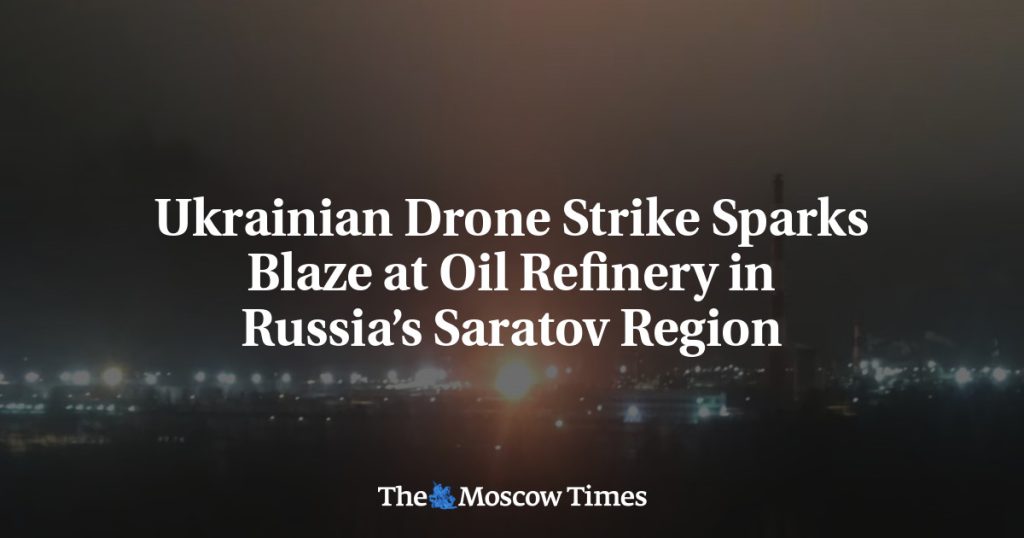Ukraine’s military intelligence has claimed responsibility for a drone strike on an oil refinery in Russia’s Saratov region, sparking a blaze that caused no casualties. The Saratov region is located 500 kilometers east of the border with Ukraine. Governor Roman Busargin confirmed the incident and stated that emergency services were working at the site. The debris from the drone fell on an industrial zone, with eyewitnesses reporting that it landed on a fuel storage tank. Residents said the impact ignited a fire at the Rosneft oil refinery in Saratov’s Zavodsky district, which has a processing capacity of 7.2 million metric tons of petroleum products.
Ukrainian media, citing anonymous military sources, reported that the drone strike on the oil refinery was part of a Ukrainian military intelligence operation. In response, Russia’s Defense Ministry stated that it had downed six out of 17 Ukrainian drones targeting the Saratov region overnight. This incident comes after both Russia and Ukraine had engaged in intensified attacks on each other’s energy infrastructure earlier in the year. However, there have been fewer reports of such strikes in recent weeks, indicating a potential de-escalation in tensions between the two countries.
The Moscow Times, an independent news outlet, shared a message with its readers, highlighting the challenges it faces as a result of being designated as an “undesirable” organization by Russia’s Prosecutor General’s Office. This designation, along with being labeled a “foreign agent,” has put the staff at risk of prosecution and is seen as an attempt to silence independent journalism in Russia. The journalists at The Moscow Times refuse to be silenced and continue to strive to provide accurate and unbiased reporting on Russia. They have called for support from readers to help continue their work in the face of repression.
The drone strike on the oil refinery in Russia’s Saratov region is the latest incident in the ongoing conflict between Ukraine and Russia. This attack comes amidst a backdrop of heightened tensions between the two countries, with previous incidents involving attacks on energy infrastructure. The use of drones in military operations has become increasingly common, allowing for targeted strikes on key facilities. Both Russia and Ukraine have reported engaging in drone operations, indicating a shift towards more sophisticated tactics in the conflict.
The targeting of critical infrastructure such as oil refineries highlights the strategic nature of the conflict between Russia and Ukraine. Disrupting the production and distribution of energy resources can have significant economic and security implications for both countries. These attacks not only aim to inflict damage on key facilities but also send a message of strength and defiance to the opposing side. The use of drones in these operations allows for precision targeting and minimal risk to personnel, making them an attractive option for military forces.
As the situation in Ukraine and Russia continues to evolve, the international community is monitoring the developments closely. The drone strike on the oil refinery in the Saratov region serves as a reminder of the ongoing conflict between the two countries and the potential for escalation. Efforts to de-escalate tensions and find a peaceful resolution to the conflict remain crucial in order to prevent further violence and instability in the region. The role of independent media outlets like The Moscow Times in reporting on these events and providing a platform for diverse perspectives is essential in promoting transparency and accountability in the midst of geopolitical challenges.














